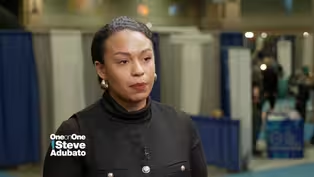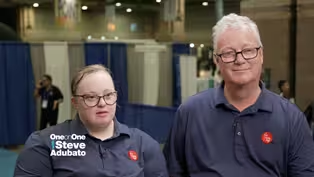One-on-One
How Monmouth University is teaching history through music
Clip: Season 2025 Episode 2781 | 8m 29sVideo has Closed Captions
How Monmouth University is teaching history through music
Steve Adubato goes on-location to the NJEA Convention to speak with Melissa Ziobro, Curator of the Bruce Springsteen Archives & Center for American Music at Monmouth University, about their tribute to Bruce Springsteen and how the exhibit aims to teach American history through music.
Problems playing video? | Closed Captioning Feedback
Problems playing video? | Closed Captioning Feedback
One-on-One is a local public television program presented by NJ PBS
One-on-One
How Monmouth University is teaching history through music
Clip: Season 2025 Episode 2781 | 8m 29sVideo has Closed Captions
Steve Adubato goes on-location to the NJEA Convention to speak with Melissa Ziobro, Curator of the Bruce Springsteen Archives & Center for American Music at Monmouth University, about their tribute to Bruce Springsteen and how the exhibit aims to teach American history through music.
Problems playing video? | Closed Captioning Feedback
How to Watch One-on-One
One-on-One is available to stream on pbs.org and the free PBS App, available on iPhone, Apple TV, Android TV, Android smartphones, Amazon Fire TV, Amazon Fire Tablet, Roku, Samsung Smart TV, and Vizio.
Providing Support for PBS.org
Learn Moreabout PBS online sponsorship(upbeat music) - Hi everyone, I'm Steve Adubato.
Recently my colleague Jacqui Tricarico and I traveled with our team to do a series of interviews down at the 2024 New Jersey Education Association Convention Annual convention.
We talked to educators, educational administrators, authors, poets, people engaged in a whole range of activities, impacting our kids, impacting our schools in the world of education.
Here now are those conversations.
Jacqui, myself and some really interesting people in AC.
- We're here at the NJEA Convention in Atlantic City.
We are welcoming Melissa Ziobro who is curator of the Bruce Springsteen Archives and Center for American Music at...?
- Monmouth University in beautiful West Long Branch, New Jersey.
- Now you've been connected to Monmouth for a while.
- I have.
I'm actually a Monmouth alum.
Then I went to work for the Army as a historian for several years before returning to teach.
So I've been teaching at Monmouth since 2007.
- What's gonna happen at this center and why is that so important?
It's not gonna open until officially till 2026, but right now there are things happening.
- There are so many things happening.
So the Bruce Springsteen collection originally starts as a fan-based collection.
Fans who were collecting tour merch and bootleg recordings.
And it comes to Monmouth University in 2011.
By 2017, Bruce makes us his official repository.
So we do have an archive on campus currently that's open to researchers by appointment.
But we just broke ground on this brand new 30,000 square foot museum facility that will open in the spring of 2026.
- But it's not all about Bruce.
What else is it about?
- It is not, and I'm so glad you brought that up, 'cause we love Bruce, right?
So we are his official repository, but we are also the Center for American Music.
And so through our programming, through our exhibits, we get to teach the entirety of American music through that very accessible prism, right?
That kind of lets people in, gets their defenses down.
We all love music, right?
And so it's such a unique way for us to explore our shared past.
- Talk about our shared past, the connection between our history, American history, and the 250 years of American music.
How the heck do we learn?
It's so interesting, the irony is not lost on me.
My wife and I are rewatching Boardwalk Empire, right?
Boardwalk Empire, a lot of it's about Atlantic City.
It was shot from 2010 to 2014, but it takes place in the early 1900s and a lot of it has music in it.
There's a question here, I promise.
Music and the history of our country and the connection, talk about that.
- They are absolutely intertwined, right?
Music both shapes and reflects our American history and culture.
- How?
- So any time period you're going to go look at, you can look at the music and understand what is happening.
I'll give you an example.
You know, we were just talking about World War I.
If you look at the music that is produced from 1914 to 1917, for example, when the United States is neutral, music supports neutrality.
When we get- - Neutral in the war?
- [Melissa] Correct.
- We're not in.
- Correct, and music supports neutrality.
Once we get into the war in 1917, music starts supporting sending your son, your husband, you know, your loved one off to war.
So we could look at other examples too.
The Great Depression, right?
Go look at the work that is produced during the Great Depression and see how it reflects the trials and tribulations of Americans who are suffering during that time.
And it goes on and on and on.
- And what about the Vietnam War, the music around that, the song War, "What is it good for?"
Absolutely nothing.
It's not just some song out of the blue.
It is connected to what's happening in the late sixties, 1970, early seventies.
- Absolutely.
As a primary source.
You know, we're here with teachers today.
They want your footnotes, they want your bibliography.
Music is a primary source that we can look at to understand what was happening.
So you mentioned the Vietnam War.
That's an interesting case because this is the first time in the Vietnam War where music almost unanimously protests a conflict.
And what a change that is from our earlier analysis of music during times of war.
So it's just enormously exciting to think about the many ways we are going to be able to use music to teach students.
I think you get a lot of students, and sometimes I'll teach a required history class and students might come in and they think, oh, this is gonna be boring.
And I'm like, are you kidding me?
Music is, history rather, is full of the craziest stories you couldn't even make up.
But it's all about the way it's presented to the students.
If they think that history is just about memorizing names and dates, well sure, I might think that was boring too.
But when we can grab their attention with music and artifacts and stories, that's when they wanna learn.
And we need students to do well on history, not just for test scores.
We need them to be well-informed global citizens who can be active participants in our great democracy.
- Well, so when and how did you become and why did you become so interested in this?
- In history in general?
I just always- - History and its connection to music.
- I've always loved history, you know, and I've been fortunate to have these opportunities to be doing history out in the public because I think there's an enormous appetite for it, if, as I said, it's done well.
So I'm just so grateful to Monmouth University and the great state of New Jersey for the opportunities I've had to pursue this field.
- And the message here at the convention is...?
- Is teachers, we see you, we celebrate you.
We are building this new, very exciting building.
And all the Bruce fans wanna come.
Yes, we want them to come, but we want you to come.
If people stop by our booth, they'll get a taste of some of- - Do you have a booth here at the convention on the floor?
- [Melissa] We do, yes.
They wanna come by the booth.
They wanna see the popup exhibit we have.
We've got some educators material- - What's in the the popup exhibit?
- My goodness.
The popup exhibit is called Music America.
And it looks at 250 years of American history through music.
It's based on this enormous traveling exhibit we have.
This traveling exhibit has 150 artifacts that document American life from, you know, a hymnal from the 1700s to an opera gown to Ray Charles sunglasses and on and on and on all the way through Taylor Swift.
We don't have all of those artifacts here today, unfortunately, but we've got a popup version of that exhibit to give people an idea of what we're going to be doing when the building opens, right?
So teachers come see us, get to know us, and one of the most important things we've got in our booth is an educator survey, because I don't want us to take a "build it and they will come" approach.
I want to hear from the teachers now, how can we best serve you?
- So it's evolving as it's happening.
- Absolutely.
- Melissa Ziobro, who is the curator of the Bruce Springsteen archives and the Center for American Music at Monmouth University, Melissa, well done, thank you.
- Thank you so much.
- We appreciate it.
- [Narrator] One-On-One with Steve Adubato is a production of the Caucus Educational Corporation.
Funding has been provided by The New Jersey Education Association.
The North Ward Center.
RWJBarnabas Health.
Let’s be healthy together.
The New Jersey Economic Development Authority.
Wells Fargo.
PSE&G.
New Jersey’s Clean Energy program.
Delta Dental of New Jersey.
And by New Jersey Sharing Network.
Promotional support provided by NJ.Com.
And by ROI-NJ.
(warm strings music) - [Narrator] No one plans on heart disease, but everyone should have a plan for it.
We help patients of all lifestyles and medical histories plan for healthy hearts.
We offer convenient screenings without judgment, hundreds of preventive programs, and women's heart specialists.
And we're the largest cardiac surgery program in New Jersey.
Make plans for a healthy heart with RWJ Barnabas Health.
Let's be healthy together.
The importance of art education and inclusivity in teaching
Video has Closed Captions
Clip: S2025 Ep2781 | 12m 2s | The importance of art education and inclusivity in teaching (12m 2s)
No Limits Cafe is making employment inclusive for everyone
Video has Closed Captions
Clip: S2025 Ep2781 | 9m 5s | No Limits Cafe is making employment inclusive for everyone (9m 5s)
Providing Support for PBS.org
Learn Moreabout PBS online sponsorship
- News and Public Affairs

Top journalists deliver compelling original analysis of the hour's headlines.

- News and Public Affairs

FRONTLINE is investigative journalism that questions, explains and changes our world.












Support for PBS provided by:
One-on-One is a local public television program presented by NJ PBS

